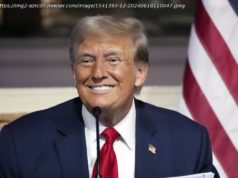The China trade war is about helping American businesses.
Congressional Republicans have swallowed endless rounds of President Trump’s antics and misconduct, from low-grade corruption, obstruction of an FBI inquiry, and the ripping of immigrant children from their mothers’ arms to a continual stream of lies from the White House.
But a proposed 5 percent tax on imports from Mexico, scheduled to take effect early next week, is a bridge too far for much of the party.
According to Burgess Everett and James Arkin of Politico, at a closed-door lunch with Senate Republicans earlier this week, “White House deputy counsel Pat Philbin and Assistant Attorney General Steve Engel faced brutal push-back from the GOP, according to multiple senators, with some threatening that Trump could actually face a veto-proof majority to overturn the tariffs.”
The sheer ferocity of opposition to the tariff gambit puzzles many people because congressional Republicans have traditionally been reluctant to challenge Trump, but also because they didn’t object when Trump has reached for tariffs in the past.
Trump imposed tariffs on imported washing machines and imported steel and aluminum in order to help a couple of particular corporate sectors in the United States. And he’s launched an extended “trade war” with China in order to secure trade policy concessions that the American business community wants.
Neither of those moves was uncontroversial, but neither of them challenged the basic logic of the GOP governing coalition. The Mexico clash is different. It not only abrogates abstract free trade principles but also it imposes economic costs on American business as part of a plan to achieve immigration policy goals they don’t really care about. That’s roused unusually strong interest group hostility, and that hostility is reflected in an unusually restive congressional caucus.
The China trade debate today is different from the one of 10 or 20 years ago, when labor unions were asking for protection against competition with low-wage Chinese labor. The point of getting tough on China, in those days, was to save American jobs from outsourcing by applying tariffs that would raise the cost of Chinese-made goods and thus discourage American companies from relying on Chinese factories for production.
Start
United States
USA — mix Why Trump’s Mexico tariffs are producing a revolt when China tariffs didn’t






